#bell gift
Explore tagged Tumblr posts
Text
Ceramic magic bell hanging
https://nellylevinstudio.etsy.com/listing/1767780094

0 notes
Text

the sillies <333
#critical role#critical role fanart#fearne calloway#chetney pock o'pea#fearniture#cr 3#bells hells#critical doodles#love them they are so sillyyyyy <333333#forever thinking about fearne carrying around the lil carved wolf chet gifted her on her new outfit <333
1K notes
·
View notes
Text

And of course he fucking loved it 😭🖤💜
#yes i'm going to be very annoying about this for the foreseeable future#critical role#cr3#cr c3#critrole#critrole memes#bells hells#bell's hells#laudna#ashton greymoore#angry crafting#gift giving#gifts#laudmoore#ashna#cr tombstone#cr gravestone#laudna x ashton#ashton x laudna#cr spoilers#cr memes#cr shitpost#courtesy of me#cr campaign three#crit role#critrole meme#1k#2k
3K notes
·
View notes
Text

real ones remember dsmp festival ctommy
#tommyinnit fanart#dream smp#dream smp fanart#I JSUT REMEMBERED THIS!!!!!!!!!#brainrotting again abt the culture in dsmp#culture of dsmp#bells for good luck... money gifts#aka twitch donations. lol#honoring the different deities#but also having fun at a festival with all your friends#since everyone had differnt origins its very diverse in looks#colors#activities etc#trad outifits really depend on the person#also tell me abt ur guys own culture#or what u think the charas would do or incorporate
488 notes
·
View notes
Text

(late) MERRY CHRISTMAS !! 💕🎄🎁
sorry I forgor to post this earlier, I just posted it on my bsky and forgot to post it here too 😭
just wanted to do a small thing for holidays at least, since I was very busy these days, and what's better than doing it with my current hyperfix?! have a lil gift from these guys and my baby 💕
#art#undertale#undertale art#undertale fanart#undertale napstablook#undertale sans#undertale papyrus#undertale toriel#undertale undyne#undertale asgore#undertale alphys#undertale mettaton#(yes he is on the couch)#undertale muffet#undertale oc#ut oc#utdr#deltarune#deltarune art#deltarune oc#(yeah belle is also part of deltarune)#no I'm not adding deltarune - (character) I'm done#lol#yeah the trick is are they in undertale or deltarune who knows#:]#also also belle is gifting sans something..... teehee#ummm forgot to put another one#sans x oc#:3
315 notes
·
View notes
Text
Narinder has some things to say about the reply on this post:

Oops! I accidentally dropped implications and foreshadowing into my goofy silly fun-times post! Oh no! Oh dear! Whatever will I do!

#“Oh hey aren't IRL bellwether sheep the ones who wear bells in a flock?#Where did the Lamb get her bell collar from anyways?“#It was a gift... of sorts :)#it's the one thing she wears that isn't directly manifested by the Crown.#and she hates wearing it.#but even so— she rarely takes it off. it ensures she can't forget what lead up to her exile.#it ensures she remembers why she needs to hate herself.#better the wool au#narilamb#cult of the lamb#cotl#cotl lamb#cotl narinder#stuff by sofie#queued
293 notes
·
View notes
Text
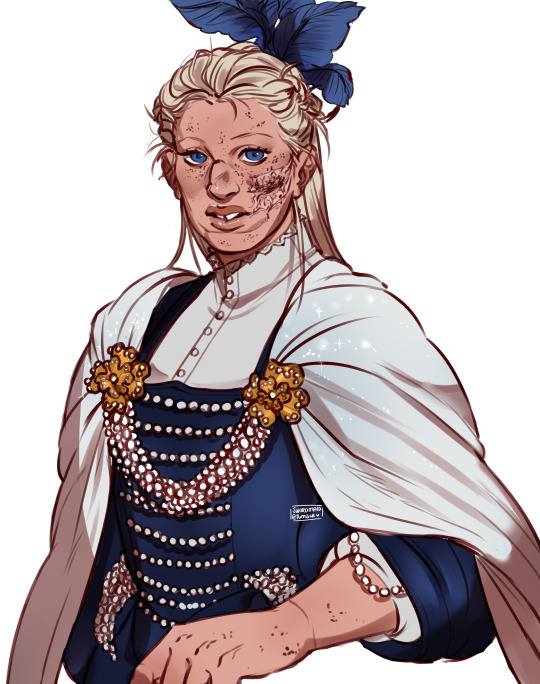
brienne but she's wearing 1949 cocteau's beauty and the beast inspired fit!!! this is the inspo pic i used if ur curious.
gonna be posting more of this redesign thing (and also jaime's ver) some time in the future but i just wanted to share this one <3
#brienne of tarth#asoiaf#mine.#u know literally just as i finished colouring this i found that some theater made an opera version of this batb#and they made belle's dress BLUE...which is a win for me and also not bc they made it light blue#but here it's supposed to be velvet.. idk if it comes across as velvet but that's the fabric of choice lol.#but im gonna ramble because i really like the concept... i love brienne in pearls!! i feel like pearls will be her jewellery of choice#and i talked abt this before in some post but i think tarth regalia would have a lot of pearls just bc they're an island#and i think they would export pearls alongside marble lol#i love brienne in silver and pearls BUT the reason why the flower thing on her cape is gold bc in the film#the pearl chain was actually a gift from the beast. so she's wearing jaime's gift. and i made the cape more silvery white (leaning on white#to resemble his cloak so it's like... jaime gifting her his white cloak..... hihihIHIHIhhihihihihi......#tbh i drew that concept before too BUT I JUST LIKE IT!!!!!!!! i want it to happen actually....please....thank u..#also the feathers in her hair is bc i want to accessorize her in a brienne way BUT ALSO supposed to be like the plumes knights wore in thei#helm. she's wearing trousers in the fit btw only the upper half of the design is based on beauty but the silhouette mimics beasts' more.#but anyway i really like this design!! bc it's a bit ott but also not in a way that seems out of character for her? idk LOL
1K notes
·
View notes
Text
i can't wait until Essek sees Mister fire the gun Bell's Hells gave him.
Essek: Excuse me, does that monkey have a gun? Fearne: Our friend Percy made it for him. Essek: Percy? Percival de Rolo, of Vox Machina, Lord of Whitestone who invented the firearm? THAT Percy? Laudna: He's Pâté's cousin!
I think Essek will just have an aneurysm on the spot.
#critical role#cr3#bell's hells#bell's hells special brand of chaos is the gift that keeps on giving
304 notes
·
View notes
Text



he treats his nuts like a scratch n' sniff
#alcoholic uncle that only shows up for christmas#he doesnt even get you a gift he's just there for food#red dead redemption 2#red dead redemption#micah bell#rdr2#red dead fandom#sjdtx.png
151 notes
·
View notes
Text

#the view#him#love#male#man#men#gay love#gay men#gay guys#gayedit#guys#just dance#jewel#jockey#just be#jew#jingle bells#jewish#merry xmas#merry christmas#merry holidays#happy hollidays#holiday gifts#holiday special#holiday greetings#holiday cheer#holiday#gas#giftcard#google
106 notes
·
View notes
Text

just wanna share with y'all this cute piece with my sweet AdlerBell i've got as gift from wonderful abbunny_art2 on instagram!!🧡🥺
i'm so in love with that, thats absolutely precious!!🥺🥺🥺🧡🧡🧡 cant stop looking at themmmm!!
and when i can't make something with them now i'm so happy that someone do this to me!!😭😭😭 i'm literally crying!!😭😭😭 i will treasure this forever!!🥺🥺🥺🥺🙏🙏🙏
things like this also motivates me to go back to drawing.... sadly, i didint draw for some months... but i will try!🥺🧡
#gift for me!#call of duty#russell adler#black ops 6#black ops cold war#cod cold war#call of duty black ops 6#adler cod#call of duty black ops#black ops#call of duty cold war#cod oc#call of duty oc#cod oc art#cod original character#cod oc: jessica bell riggs#adler x oc#russell adler x oc#oc x canon#adler x bell#adbell#adlerbell#russell adler x bell#cod bocw#bell cod#call of duty bell
52 notes
·
View notes
Text

My osc gift exchange for @mumpsetc
Very neat character 🖥️🌼
#osc gift exchange#object show#object shows#osc#myart#yo this was so fun#the background was based on the windows background#also the name daisy bell#i get it#smart name choice#object show community
267 notes
·
View notes
Text

For his birthday, Belle thought a lot what should gift to him. Then she remembered that she can actually sing and play guitar. So she dedicated to him a song which is wrote by herself.
HAPPY BIRTHDAY LYCAON!
#lycaon#belle#von lycaon#lycabelle#zzz#zzzero#zenless zone zero#illustration#comics#drawing#guitar#love#happy birthday lycaon#birthday#gift#furry
103 notes
·
View notes
Text
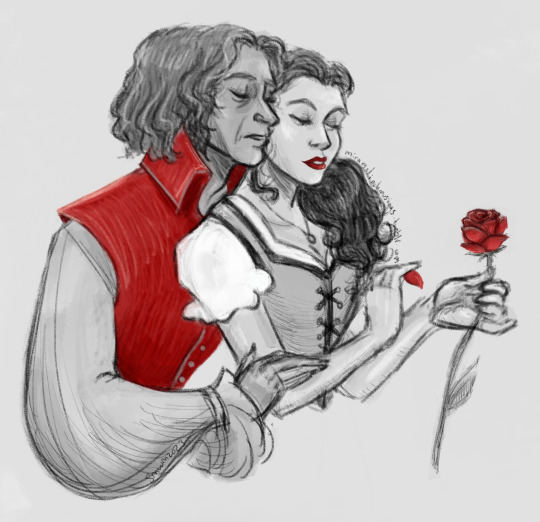

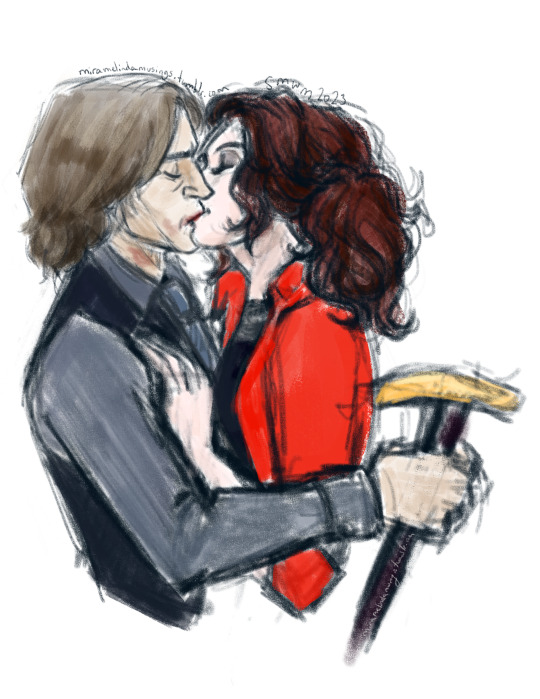
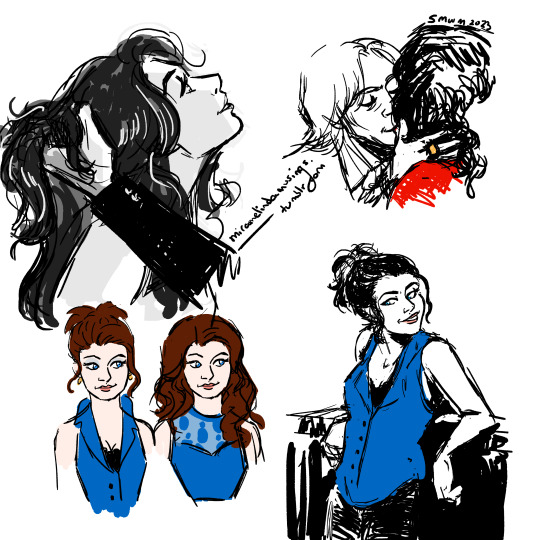
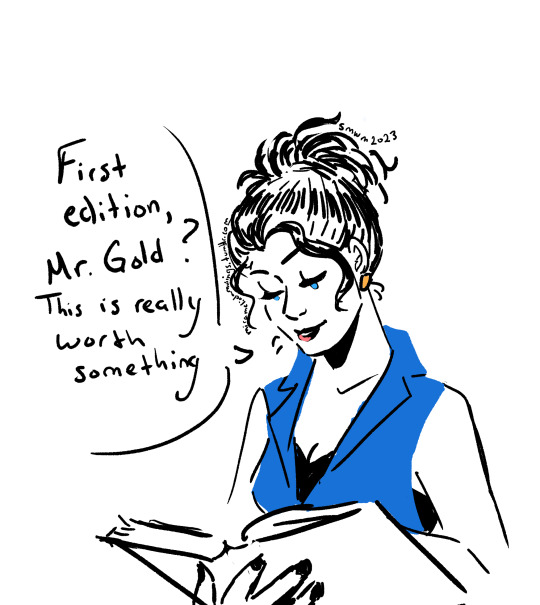
The moment there is a bit of cool weather where I live, all I can think about is rumbelle. I've been thinking alot about Lacey too so here are a few of the sketches I've done :)
#rumbelle#ouat#golden lace#mr. gold#rumplestiltskin#belle ouat#lacey french#lacey x gold#my art#my fanart#digital art#A day of cold weather after all this heat and I'm thrown back to late August/September of 2013#I've just watched OUAT and I am heading to my first year of college and the other first year girls are just as nervous but they're nice#and some watched OUAT and when season 3 started that September we huddled on the couch and watched the episodes as they aired#the cold makes me remember that first year watching OUAT in the dorms with those girls and how cold it could get in winter#after the first year we mostly went separate ways-not for any bad reason just naturally. I have such good memories of those girls though#we celebrated birthdays and holidays together-I still have the shirt of Captain Hook they gifted me#I hope they're happy wherever they are#I found OUAT and Rumbelle when I was discovering myself#those first three seasons hold such nostalgia and magic for me#on another note#Lacey was such an interesting character that I wish they did a little more with#I've been sketching some things out and little doodles about her#like who were her friends? who did she talk to? what are some subtle similarities to Belle but the curse distorted?#I can't imagine having someone look at me but want someone else and other people in town say who you are is wrong/incorrect#I've just been thinking about Lacey bristling at the thought and I remember feeling a little bad that no one really wanted her but Belle#and what about intimacy? perhaps Belle's and Lacey's preferences could be similar but Lacey is more overt about it#anyways just some things I've been thinking about lately :)#I couldn't decide with the golden lace pic if there should be lipstick stains or not so here's both :)#used refs for some posing and hand gestures
430 notes
·
View notes
Text
I love Dorian this episode referring to Ishta as "clearly a threat." In the previous episode, his argument was that the sword was just a sword, a tool, an inert object that only has meaning if you give it one. Additionally, he advocated for Orym to keep the sword, which is certainly interesting in light of his opinion that it was a threat. But I also wonder exactly in what manner Dorian regarded the sword as a threat. Because it was explicitly noted as not being cursed, just having a dark history, and Dorian's own argument hinged on it being nothing more than object.
But, re: some of his character details revealed back in the EXU wrap-up, I wonder if it wasn't a reference to the sword as threat to the group dynamic. Dorian's sense of morality is notoriously insular to his group and this seems to still hold true. We saw it in 95--Dorian floated the idea of killing the Pumats in order to obtain all the magical items the party wanted in case they didn't have enough money to cover it legitimately. And in regards to circlet, he was intent that the party in EXU keep the item, not because he wanted to use it, but because he didn't trust anyone else to have it. But the specific detail from the EXU wrap-up I find most significant here is Dorian's plan regarding the crown, should it have proved to create undeniable, irreparable damage to the group dynamic: "I had ideas of what to do about [the crown] if it ever came between us, though. That's something that I'd been planning the whole time after I realized that was that, 'If this gets in the way of the group, how do I get rid of the crown?'" That singular "I" really stands out to me. Not, "how do we get rid of this as a group?" but how do I specifically, singularly, get rid of it to spare the group dynamic?
It all really falls in line with his character and the way he's previously reacted to powerful magical items. It's a powerful item that could be a threat, either magically or to the group. Who should have it? Orym, who clearly wants it a great deal and from whom taking it could cause damage to the group, and who also happens to be the person Dorian trusts the most. It's not actually cursed, so it's just an item and the meaning it has is only what we allow it to have. But it's still a threat because it could tear the party apart. I wonder if that old thought ever occurred to him ("if this gets in the way of the group, how do I get rid of it?") or if letting Orym keep the blade was, in fact, the thing he decided would cause the least group friction of all the options they had.
#tbh the wrap-up comments on dorian are the gift that keep on giving#cr spoilers#critical role#bells hells#dorian storm
114 notes
·
View notes
Text
Based on the conversations that both Keyleth and Caleb have had with Imogen recently, I’m gonna need the three of them to form a support group for “super powerful yet narratively-cursed individuals with a dash of parental trauma” after this is all over.
#critical role#cr spoilers#bells hells#cr3#imogen temult#keyleth of the air ashari#caleb widogast#c3e111#truly the traumatized gifted kids of all time
53 notes
·
View notes